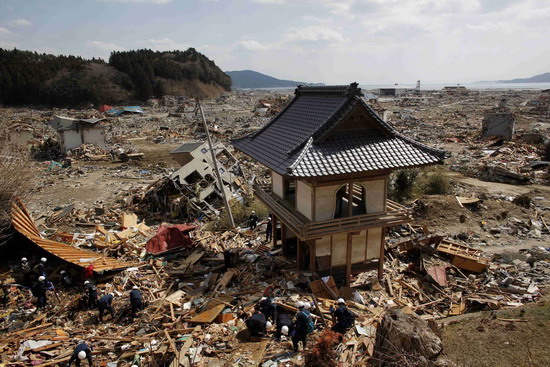Latest News
Japan cites radiation in milk, spinach near plant
(Agencies)
Updated: 2011-03-19 17:25
 |
Large Medium Small |
|
 A stone statue of Jizou, the guardian of travellers and children, is seen among rubble in Ishimaki City in Miyagi Prefecture in this picture taken by Kyodo News on March 19, 2011. [Photo/Agencies] |
TOKYO -- Spinach and milk taken from farms near Japan's crippled nuclear plant exceeded government-set safety limits for radiation, the government said Saturday, in the first report of food contamination from the accident.
The tainted milk was found 20 miles (30 kilometers) from the plant while the spinach came from a neighboring prefecture, Chief Cabinet Secretary Yukio Edano told reporters.
While the radiation levels exceeded the limits allowed by the government, Edano said that the products "pose no immediate health risk" and that further monitoring was being conducted on other foods. If tests show further contamination, Edano said food shipments would be halted from the area.
The spinach radiation level is about one-fifth of one CT scan, he said.
"We are doing our utmost efforts to ensure the health of our people," Edano said.
Nuclear reactors at the Fukushima Dai-ichi plant began overheating and leaking radiation into the atmosphere in the days after the March 11 earthquake and tsunami overwhelmed its cooling systems. The government admitted it was slow to respond to the nuclear troubles, which added another crisis on top of natural disasters which left an estimated more than 10,000 dead and displaced more than 400,000 others.
Emergency crews worked Saturday to cool the reactors and fuel storage pools by spraying water and to restore electricity. Edano said the situation while bad was not growing worse.
"The situation at the nuclear complex still remains unpredictable. But at least we are preventing things from deteriorating," Edano said.
|
 Emergency workers search through debris near the seaside in Rikuzentakata, Iwate prefecture, March 19, 2011. [Photo/Agencies] |
| 分享按鈕 |




